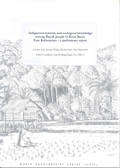| Working Paper Series |
 |
|
| Title | Indigenous systems and ecological knowledge among Dayak people in Kutai Barat, East Kalimantan-a preliminary report | | Author | Laxman Joshi, Kusuma Wijaya, Martua T Sirait and Elok Mulyoutami | | Year | 2004 | | Project series (series title) | ICRAF Southeast Asia Working Paper No. 2004_3 | | Publisher | World Agroforestry Centre - ICRAF, SEA Regional Office | | City of Publication | Bogor, Indonesia | | Number of Pages | 22 | | Physic description | ill ; 29 cm | | Call Number | WP0008-04 | | Keywords | Indigenous Systems, Ecological Knowledge, East Kalimantan, Sustainable Forest Management |
|
| Abstract: |
| Sustainable forest management and conservation initiatives are becoming increasingly important in the tropics as the alarming rate of deforestation continues. The almost completed deforestation in East Kalimantan, one of the most ecologically diverse rainforest in the world, provides an undisputed example. The indigenous management systems along with communal conservation of forest resources as well as the indigenous knowledge of biodiversity are on the verge of disappearance due to a numbeer of factors-uncontrolled logging, gold and coal mining, village conflicts and rampant corruption - all for personal short-term economic benefits. The indigenous system and participatory approaches to conservation, documentation and promotion of the indigenous knowledge with due respect of intellectual property rights of these indigenous people require immediate attention. This is a report of a rather quick and premilinary invesgation through farmer consultation and field visits to Kutai Barat district in East Kalimantan supplement with some literature review.
The Dayak were traditionally forest dwellers. The environmental has shaped their complex culture and beliefs. The vice versa is equally true. The Dayak people created a mosaic of land use systems including swidden agriculture, mixed fruit orchards, rubber and rattan plots and woodlots. Customary laws shaped the landscape and dictated exraction of forest products from common properties; while household owned resources were also managed in which conservation, diversity and sustainabilitty are clearly seen important. Indigenous value and knowledge of biodiversity is understandably rich among the Dayak people. Numerous indigenous landuse systems have potential for in-depth knowledge investigation. The umaq (non-irrigated paddy fields remains at the heart of heart of landuse change and their indigenous knowledge about natural palnt species, their functional (use and ecological) values is key aspects of Dayak indigenous communities. The use of certain plants as indicators of soil fertillity is well reported in the literature, but in-depth knowledge about these plants and other useful plants are still inadequately studied.
The umaq plots, normally after a year of rice cultivation, are later allowed, with enrichment planting of fruit trees, rattan, to develop into simpukng (forest garden) that are an important resources for the Dayak Benuaq for collecting fruits, medicines, timber, firewood, rattan, wildlife. A range of simpukng serve a myriad of functions-ecological, econimic, religious, and cultural. Bengkar (forest reserve) are lagerly community controlled but currently under pressure from extensive logging activities and large-scale plantations. There is much ecological knowledge among the Dayak people about valuable and use plant species and wildlife, their habitats in these simpukng and bengkar system that are invaluable for resource management. Quick action is required from development agencies to understand and document indigenous knowledge and find ways to promote participatory community action to preserve. The weakning community cohesion necessary for effective partipatory community management, largely related to the on-going quick-buck strategy in logging and
mining activities will requuire some serious thoughts. Also the issue of policy on land tenure is likely to remain influential in natural resource management in Kutai Barat. |
|